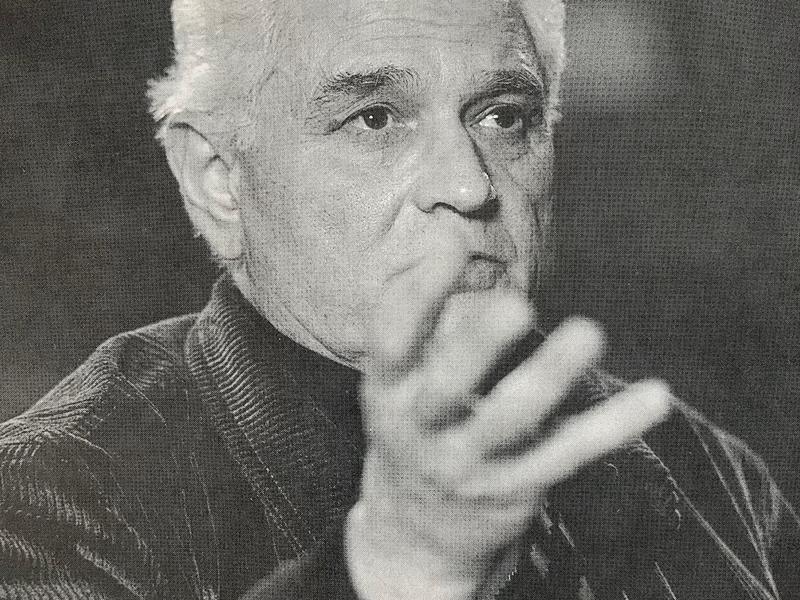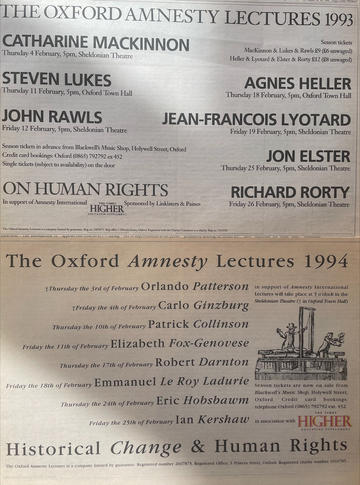THE OXFORD AMNESTY LECTURES, A MEMOIR

THE OXFORD AMNESTY LECTURES, A MEMOIR
The first Oxford Amnesty Lectures were staged in Oxford 30 years ago. Stephen Shute remembers what happened
Published: 17 May 2022
Author: Stephen Shute
Share this article
When the Oxford Amnesty Lectures were founded in the early 1990s, they were built on a simple vision: to create an annual series of lectures delivered to a fee-paying audience by some of the best thinkers in the world. We hoped to provide income for Amnesty International; to enliven Oxford’s intellectual life; and to raise the profile of human rights in the academic community. With the exception of 2000, 2009, and 2011, we repeated the model from 1992 to 2012: a total of 124 lectures and 18 series in all.
There was a small Organising Committee of volunteers, initially with six members – Madeleine Forey, John Gardner, Ewen Green, Chris Miller, Peter Snowden, and myself. Forey and Gardner were Fellows of All Souls College; Green was a Fellow of Magdalen College; and I was a Fellow of Corpus Christi College.
Over time, other people joined and left the Organising Committee and each played a valuable role.
In addition to the Organising Committee, we established an Honorary Committee, among it luminaries such as Terence Cave; G.A. Cohen; Michael Gilsenan; Michael Ignatieff; Alan Montefiore; Martha Nussbaum; and Anthony Smith.
To provide appropriate governance we created a limited company, Oxford Amnesty Lectures Limited, as the management vehicle and obtained charitable status for it. Both the lectures and the company we had established were autonomous entities, separate from Amnesty itself and from the University of Oxford. This point had to be made clear on several occasions.
Because delivering our core goals depended on the size of our fee-paying audience, securing a cadre of the very best speakers from across the globe was essential. This meant paying travel costs and subsistence expenses. We also needed to hire venues and initially these cost between £150 and £250 per lecture.
During the life of the Lectures, we used six different venues, but the chief of these was the Sheldonian Theatre which could hold approximately 1,400 fee-paying attendees. We would need that capacity.
Jacques Derrida, the founder of deconstruction, came and that caused queues in Holywell Street to buy tickets from Blackwells Music Shop. He was something of a bête noire in Oxford and our invitation coincided with a furore over his nomination for an honorary degree at the University of Cambridge. The heat generated by that proposal is well illustrated in a letter from the editor of The Monist, Barry Smith, which was signed by 18 other international philosophers. Published in The Times on 9 May, 1992, it accused Derrida of ‘stretch[ing] the normal forms of academic scholarship beyond recognition’ and ‘employ[ing] a written style which defies comprehension’.
Part way through the first series, Stuart Jeffries, a feature writer at The Guardian, penned a review under the provocative title ‘Bit of the other’. It drew attention to the zeitgeist into which we had tapped, though he had a particular axe to grind:
‘Over the past couple of weeks some of the most trendy names in French thought ̶ including Julia Kristeva and Paul Ricœur ̶ have been lecturing at the home of the analytical enemy, where the supposedly wildly speculative turn of continental thought is despised …’
On Derrida he said:
‘It was a suave performance, but the event only satisfied those who had come to see that rare thing ̶ a famous, living and publicity conscious philosopher.’
The seven-lecture series began with Paul Ricœur, continued the next day with an interview with Derrida (filmed by Channel 4), and concluded three weeks’ later with an outstanding talk from Edward Said. There was now no doubt that we had a success on our hands and a firm foundation on which to build.
Of all the reviews of the first series, that by James Wood, then Chief Literary Critic for The Guardian, best captured the febrile atmosphere of the time, albeit in somewhat florid language. In The Times Literary Supplement on 3 April, 1992, he wrote:
‘Last month, in the long afternoon of theory, some famous practitioners came to Oxford to paint their valedictory sunsets. This, anyhow, is how it felt. All of them, except Edward Said, had a melancholy tinge. Like arraigned revolutionaries, they stood before us wearily burdened with the crimes of their less intelligent followers. After the bloated scepticism of recent years here was humility and withered pragmatism. Paul Ricœur, who opened the Amnesty Lectures on Freedom and Interpretation, set the tone with his awkward apology for presuming to speak theory in Oxford, ‘the home of the English empirical tradition and logical positivism’. This became a kind of grace before each meal: Hélène Cixous and Julia Kristeva said the same when their turn came.

The star of the series was its second lecturer, Jacques Derrida, ‘the most famous philosopher in the world’, as one newspaper has called him. An audience of 1,400, mostly young, packed into the Sheldonian. Photographers with their barrel lenses hogged the front row; a television crew was ready with dazzling lights. Derrida looked foxy and prosperous. He has a small head with a floury loaf of white hair laid over it. He squints analytically. Wearing a dark green corduroy suit and carrying a neat shoulder bag, he announced that he had not realised that this was a series of lecturers, so he would only be heard in conversation (with Alan Montefiore, an Oxford philosopher). This Derridean misreading fooled no one.’
If Derrida (pictured, top, in his green corduroy at Oxford) was the star of the first series in 1992, John Rawls was the star of the second series in 1993. However, working on his lecture in the summer of 1992, Rawls became perturbed by rumours he had heard about the Derrida event. He wrote to me and John Gardner for assurance that his lecture would be delivered ‘in a suitable academic setting’. We wrote back immediately to settle his mind, noting that we had no wish to see the Derrida format used again and promising that all the events in the 1993 series would take the form of orthodox academic lectures. Rawls’ hand-written reply came back by return:
‘I am very grateful for your letter of August 3 … Be assured my mind and worries are completely quieted; and your assurances fully satisfactory. I am rather intimidated [by] lecturing in the Sheldonian but that was part of the arrangement from the start!’
While Rawls’ lecturing style may not have been to everyone’s taste ̶ an article in Oxford Today described it as ‘less than luminous’ ̶ it was another memorable occasion. Ronald Dworkin (who gave his own Oxford Amnesty Lecture in 2008) introduced him to a full house and the lecture’s subsequent publication in On Human Rights was a landmark moment for Rawls’ scholarship. Despite his characteristic diffidence ̶ sending his first draft to me for comment in September 1992, he said: ‘I hope my account of human rights, shoddy as it is, does not dismay’ ̶ the essay became widely read. It was his first original piece for some time and broke new ground for his theory by explaining how the ideas he had set out in A Theory of Justice could be applied at the international level.
Costs were kept firmly under control with economy travel for speakers and their accommodation mostly in colleges. We obtained a sizable book publishing contract for the lectures with Basic Books, a division of Harper Collins.
Entitled Freedom and Interpretation, the first volume to be published contained essays from six of the seven lecturers: Paul Ricœur; Hélène Cixous; Julia Kristeva; Sir Frank Kermode; Wayne C. Booth; and Edward Said. Derrida did not provide a text. As we have seen, he had chosen the format of an interview with Balliol academic, Alan Montefiore, rather than delivering a formal lecture. That left the book one essay light and we filled the gap by commissioning a seventh essay from Terry Eagleton. The book was introduced and edited by Barbara Johnson.
In the second year, we negotiated an identical deal with Basic Books for a volume entitled On Human Rights, which was edited and introduced by the philosopher Susan Hurley and myself. The cast list was again extraordinary: Catharine MacKinnon; Steven Lukes; John Rawls; Agnes Heller; Jean-François Lyotard; Jon Elster; and Richard Rorty.
The third book, Historical Change and Human Rights, featured lectures by Orlando Patterson; Carlo Ginzburg; Patrick Collinson; Elizabeth Fox-Genovese; Robert Darnton; Emmanuel Le Roy Ladurie; Eric Hobsbawm; and Sir Ian Kershaw.
The fourth series, The Dissident Word in 1995, which focused on novelists and included Gore Vidal, André Brink, Edmund White, Wole Soyinka (winner of the 1986 Nobel Prize for Literature), Nawal El Saadawi, and Taslima Nasreen, was the last to be published by Basic Books. Other publishers took on the role thereafter, including Oxford University Press.
We achieved a lot of publicity and some notable sponsorships.
Finally, in 2012, the 18th series brought things to a close much as we had begun, by stirring things up. Entitled Protect the Human/Protect the Planet, it generated a letter from climate change sceptics and the Heartland Institute asking the University of Oxford to ban the water expert Peter Gleick from speaking because it was alleged that he had tricked the Institute into turning over ‘confidential documents outlining its fundraising plans and key donors’. Gleick had already apologised for his role in that incident and had taken leave from the Pacific Institute which he had founded because of it. The Oxford Amnesty Lectures confirmed his lecture would go ahead:
‘The 2012 series, like those before it, reflects Oxford Amnesty Lectures’ commitment to supporting freedom of expression and fostering robust debate about human rights. Of course the Lectures are not University lectures and so the University of Oxford could have no role in their continuation or withdrawal.’
We organised a number of lunches and dinners, wherever possible seeking sponsorship. Oxford Colleges and the Maison Française were particularly generous in helping out. In 1992, three dinners were put on by the Maison Française: for Ricœur; for Derrida and Cixous; and for Kristeva. In 1993, the Maison Française put on a lunch for Lyotard; and in 1994 it hosted a lunch for Le Roy Ladurie and Darnton. I organised a dinner at Corpus Christi College in 1993 for Rawls and Lukes. The distinguished guest list included Sir Isaiah Berlin, to whom I sent a copy of On Human Rights. He wrote back from his Oxford home at Headington House to thank me but did not mince his words:
‘… I shall read the lectures with great interest ̶ all except the Frenchman whose name I cannot remember, whom, like Derrida, I find repellent.’
He was, of course, speaking of Lyotard. Berlin did, though, read and attend not only the lecture given by Rawls but also that given by Rorty. As Peter Aspden said in his review in the T.H.E.S. on 26 February, 1993, Rorty’s approach ‘may not lie within the mainstream of any academic philosophy, let alone Oxford’s version of it, but it can still reduce an audience to respectful silence’.
When the Oxford Amnesty Lectures were created 30 years ago, there was a strong appetite from City residents to come together with members of the academic community in a formal setting to listen to speakers who they knew would have something interesting and important to say about issues which matter. High-profile, well-advertised, open lectures in Oxford were a rarity and it was that gap that the Oxford Amnesty Lectures were able to fill. Since then much has changed. Celebrity public lectures have grown like topsy and the uniqueness of the Oxford Amnesty Lecture series has gone. Consequently, it became harder and harder to fill large venues with fee-paying attendees, a change which was accentuated by the digital revolution and the accompanying development of parallel online initiatives such as TED talks.
The Lectures, in a sense, became the victims of their own success, but while the sun shone the Lectures thrived, raising more than £120,000 for Amnesty International and publishing 17 books. The Oxford Amnesty Lectures are, in short, something of which we rightly feel proud.
Stephen Shute is Professor of Criminal Law and Criminal Justice University of Sussex and former Fellow of Corpus Christi College.















